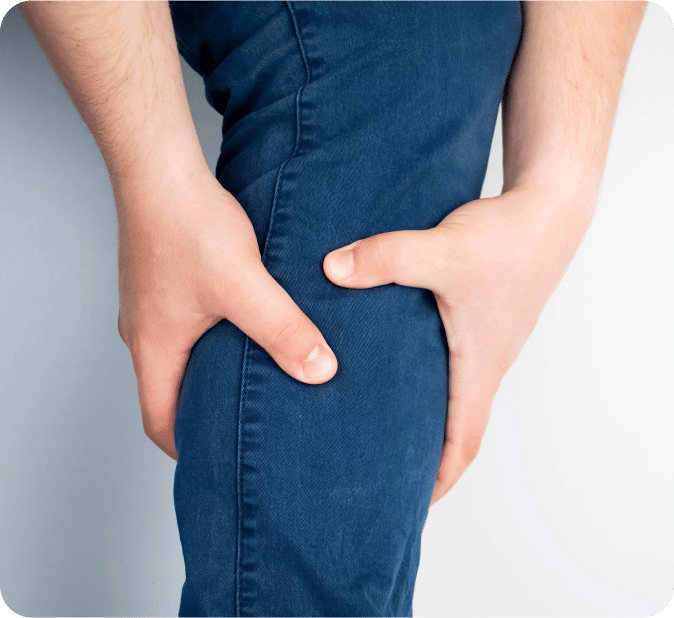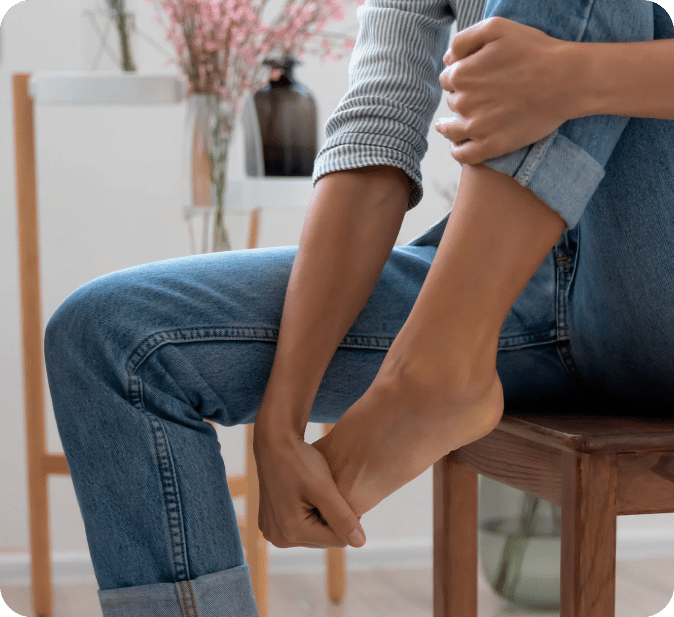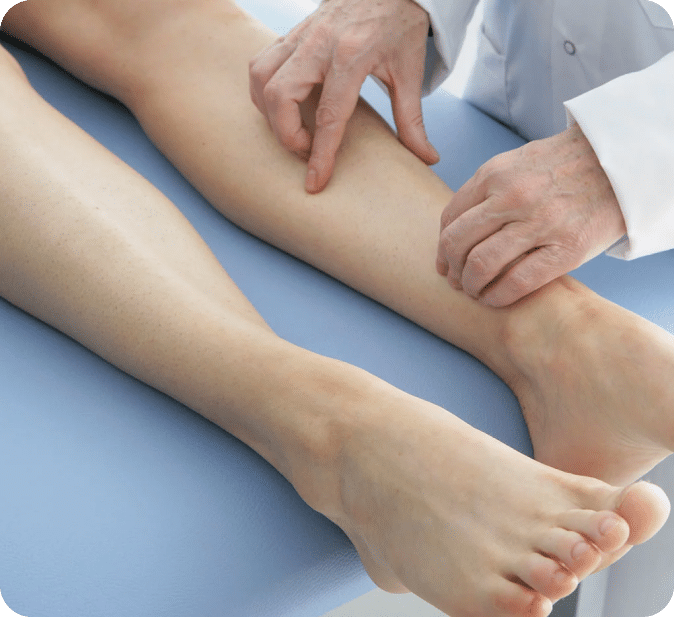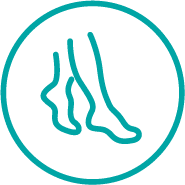Restless Leg Syndrome
How Can I Identify Restless Leg Syndrome?
Restless Leg Syndrome (RLS), is a neurological disorder causing uncomfortable leg sensations and a strong urge to move them. RLS can affect the lives of individuals, disrupting sleep and affecting their quality of life. These feelings can vary in severity.
RLS Potential Effects:
- Periodic Limb Movement of Sleep (PLMS): Repetitive and unintentional leg twitching during sleep. PLMS can disrupt sleep, causing daytime sleepiness, reduced alertness, difficulty concentrating, and feeling unrefreshed upon waking.
- Emotional distress: Many people report depression, anxiety, and reduced overall quality of life.

Signs of RLS:
Feeling the need to constantly move your legs-especially at night- along with a tingling sensation and cramps.
Treatments for RLS:
- Lifestyle Changes
- Regular physical activity: Daily exercise such as walking, jogging, swimming, or yoga can help decrease RLS symptoms.
- A healthy diet: Aim for a balanced diet rich in iron and other essential nutrients. At the same time, limiting the intake of caffeine, alcohol, and tobacco is highly recommended.
- Maintaining a consistent sleep pattern: Ensuring a regular sleep schedule with adequate sleep duration is crucial.
- Taking medication: For more severe cases, you may require medication to help manage RLS symptoms.
- Alternative Therapies: Wearing compression socks, thermal therapies, relaxation techniques, massage, and other physical therapies can help relieve your symptoms.

Possible Origins of Restless Leg Syndrome
Family History:
It appears that some cases of RLS could be related to genetics and the environment, especially in those who experience symptoms before 40 years of age.
Imbalance in Dopamine:
Dopamine is a chemical that transmits signals in the brain. It plays a vital role in controlling muscle movement and is fundamental in regulating mood and feelings of pleasure. Therefore, an imbalance in dopamine pathways may lead to uncontrolled movements.
Iron Deprivation:
This condition can interfere with dopamine production, thereby triggering or worsening RLS symptoms.
Potential Risk Factors for RLS:
Some of the risk factors associated with RLS include chronic conditions like pregnancy, kidney failure, diabetes, peripheral neuropathy, spinal cord conditions, rheumatoid arthritis, venous insufficiency, and Parkinson’s disease. Also, lifestyle factors like alcoholism, smoking, and lack of regular exercise can increase the risk of RLS.
Relieving Restless Leg Syndrome
Restless Leg Syndrome is a complex condition that can significantly affect someone’s quality of life.
If you want longer-term solutions, it’s essential that you find a specialist who can accurately diagnose and effectively address the root cause of your symptoms.
With our patient-centered approach, advanced vein treatments, and dedicated team of top vein specialists, we aim to provide care that not only treats the condition but also reassures and empowers our patients. Don’t let RLS control your life – reach out to Premier Vein Doctors today, and take your first step towards a healthier, happier life.

Calming RLS Symptoms

Compression therapy
Compression socks can temporarily relieve discomfort and promote circulation.




Stretching
Compression socks can temporarily relieve discomfort and promote circulation.




Massages
Massaging your legs before going to bed improves circulation and mitigates the symptoms.
Frequently Asked Questions
When visiting the doctor, be ready to describe your symptoms and answer any questions they may have. Tell them if you feel a strong urge to move your legs (especially during the night) and if it goes away after doing so. They will also ask about your medical background.
Even though it’s referred to as RLS, you can actually feel symptoms in other parts of your body too, like your arms.
Approximately 10% of people in the United States are affected by RLS. This condition is found more often in females than males, and symptoms tend to appear in individuals around 40.
Still, young people can be affected too. In actuality, both kids and teens can experience RLS. About a third of those with RLS notice signs before they age twenty.
Unfortunately, there is no known cure for the condition. Nonetheless, it’s essential to correctly identify the causes that lead to RLS to develop an effective treatment plan that will address any underlying issues.
It is uncommon, but in some cases, individuals with RLS have reported symptoms disappearing without any medical intervention. Unfortunately, many people find that their condition worsens over time and thus requires medical care.
Restless leg syndrome might indicate an underlying health problem, such as diabetes, anemia, Parkinson’s disease, or venous insufficiency. If not treated, these conditions could worsen and cause more severe harm. That is why it is essential to talk to your doctor to get to the root cause of your symptoms instead of just managing them.
If you’re experiencing symptoms of restless legs syndrome, there are a few things you should avoid. These include alcohol, cigarettes, coffee, chocolate, and other caffeinated drinks. Be sure also to tell your doctor if you use anti-nausea medications, psychiatric drugs, or antihistamines.
Several studies suggest a significant overlap between RLS and vein diseases such as varicose veins and chronic venous insufficiency. One theory is that inadequate blood flow from these conditions could trigger RLS symptoms.


How may we assist you?
Request a Consultation
We are here to assist you in getting the care you need. Please provide us with your contact information, and we will help you schedule an appointment, verify your insurance coverage, or answer any questions. Our top priorities are your health and well-being.
Tell us how we can reach you.
Find Your Nearest Clinic
Locate one of our clinics near you and prioritize your health today. Our top-rated medical centers offer multiple services and convenient locations to provide patients with needed care. Contact us today to schedule an appointment!
Find Your Nearest Vein Clinic
Find a reputable vein clinic near you and prioritize your vein health. Our top-rated clinics offer various services and convenient locations to provide needed care. Contact us today to schedule an appointment and take the first step towards healthy veins.
Find Your Nearest Vein Clinic
With 9 convenient locations, our top-rated clinics are easily accessible to provide you with the best care. Trust us to prioritize your health and well-being, and experience the ease of having a clinic near you.
